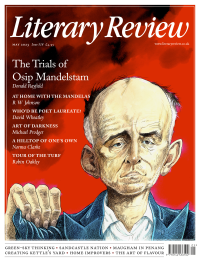Jane O’Grady
Writing a Match
The Marriage Question: George Eliot’s Double Life
By Clare Carlisle
Allen Lane 369pp £25
‘They lived happily ever after’ is conventionally the sentence that concludes a fairy story. By outwitting witches and vanquishing giants and monsters, the hero, whether prince or peasant, has finally won the princess. But we rarely hear what happens after the wedding. Similarly, although the novel of adultery began to flourish in the 19th century, many popular novels presented marriage as the culmination of a journey through vicissitudes valiantly overcome. ‘Why’, demanded Sarah Stickney Ellis in 1843, should ‘marriage, like death [be] made the end of a woman’s existence … whereas both are but the beginning of states of existence infinitely more important than that by which they were preceded’? If Mrs Ellis, a pious Christian, criticised delusory fantasies about marriage in her improving tract The Wives of England, how much more so, for different reasons, did the progressive thinkers of the time. Yet almost 150 years on, as Clare Carlisle observes, some 750 million people watched the wedding of Charles and Diana. In spite of the radical politics of the 1960s and 1970s, she writes, ‘the marriage ideal was thriving’.
Carlisle, a philosopher at King’s College London, finds it odd that marriage is so rarely treated as a serious philosophical topic, a sense compounded by the recent spate of philosophising on erotic and romantic love. Unlike these, marriage is not merely confined to the individual or couple. It is deliberately public, supposedly long-term and has ‘epic proportions’, if only because it ‘stretches out through time, into the future, growing and changing’.
Carlisle’s stated aim is to explore the topic of marriage through a combination of biography (the life of George Eliot), literary interpretation (of Eliot’s works) and philosophy. The Marriage Question opens in July 1854, with the then Marian Evans (translator of Strauss and Feuerbach, and writer for the prestigious

Sign Up to our newsletter
Receive free articles, highlights from the archive, news, details of prizes, and much more.@Lit_Review
Follow Literary Review on Twitter
Twitter Feed
How to ruin a film - a short guide by @TWHodgkinson:
Thomas W Hodgkinson - There Was No Sorcerer
Thomas W Hodgkinson: There Was No Sorcerer - Box Office Poison: Hollywood’s Story in a Century of Flops by Tim Robey
literaryreview.co.uk
How to ruin a film - a short guide by @TWHodgkinson:
Thomas W Hodgkinson - There Was No Sorcerer
Thomas W Hodgkinson: There Was No Sorcerer - Box Office Poison: Hollywood’s Story in a Century of Flops by Tim Robey
literaryreview.co.uk
Give the gift that lasts all year with a subscription to Literary Review. Save up to 35% on the cover price when you visit us at https://literaryreview.co.uk/subscribe and enter the code 'XMAS24'